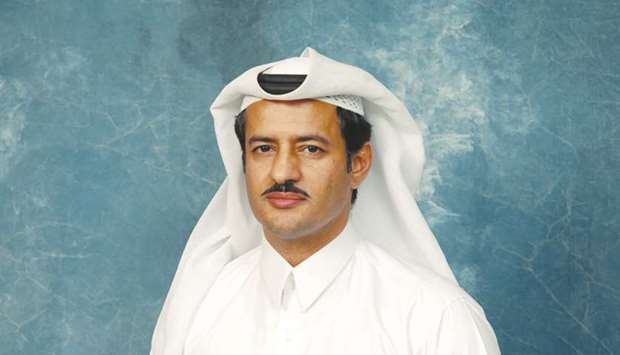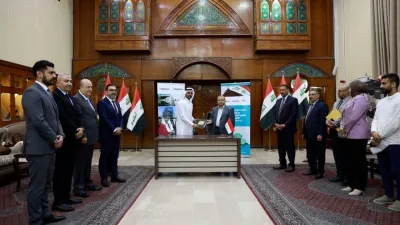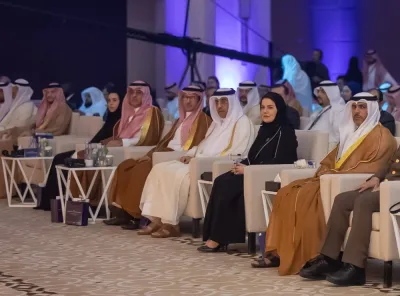In an interview with Gulf Times, he addressed some of the pressing questions related to the economic and political dimensions of the crisis.
Regarding the impact on trade he said, “Intra-trade within the GCC countries relative to the rest of the world has remained low at around 10% for decades now. The blockade is mostly affecting a narrow range imports, namely, dairy products and vegetable supply chains and construction materials. Imports from the UAE stand at 9%, mostly re-exports through Dubai. These can be rerouted through other ports in the region such as Oman, or can be imported from their sources (re-exports to Qatar constitute about 30%). Imports from KSA amount to 4% and from Bahrain 1%. This relatively small amount can be substituted with imports from other countries.
“Therefore, there is not much room to pressure through trade sanctions and the effect will be limited.”
He added that while Qatar can find alternative sources of imports, the blockading countries will lose the Qatari market and also lose ethically. Diversification of supplies is key to the future security of Qatar, he said.
“We have to diversity sources and means of imports just as we do with our investments and reserves to spread risk and avoid reliance on a few sources, means or ports.
“In the short run, we have what I call the first line of trade, imports extending from Turkey to Iran and Pakistan to India. The Oman ports can possibly replace much of Dubai re-exports. Then we have countries in Europe, Asia, Africa, and Australia, and then the rest of the world. We have a giant sea port and a world-class airport both with high capacities which can be utilised now.”
He acknowledged that if the blockade extends over a long period there could be wider impacts.
“If the sanctions remain for an extended period, for example, 6 months or over, then they could have impacts through channels like trade, prices, and confidence,” he said.
In a long drawn out stand-off he saw a role for state intervention.
“In a more complicated situation in which the market cannot provide essential products or services, then the State can intervene as an importer, distributor and price regulator. Unusual or unconventional circumstances dictate unconventional policies,” he said.
With regard to the impact of the sanctions on prices, he said, “We could see an increase in price of some of the items due to rerouting of supply lines, shipping costs, or price increase from the sources. This is generally a cost push inflation in a possible range of 1%-1.4% headline inflation.”
Confidence could be affected by a long term dispute. “Elevated uncertainty could impact the business environment, investment, and financing conditions, which could negatively impact the growth in the non hydrocarbon sector, possibly reducing it by 1%. The hydrocarbon sector shouldn’t be affected,” he noted.
He believes that domestic policies must be implemented to protect Qatar against isolationist measures.
“We need to listen to local producers – agriculture and animal producers, understand their concerns on the production and marketing sides and provide them with support and incentives to boost increase/expand production,” he said.
He added, “We need to address monopolistic structures and promote competitiveness in these markets. We need to employ technology and innovation to overcome difficulties related to the environment and promote/boost production. We need to redirect local manufacturing industry toward addressing domestic market needs in construction.”
He saw no reason why Qatar cannot be self sufficient in dairy and poultry products.
Looking at the economy of Qatar as a whole, its resilience, he said, could be attributed sound economic policies adopted by the government over the boom years to utilise its resources. “The huge investment in the hydrocarbon (LNG) sector has provided sustainable source of income to the country to a significant extent and has shielded the economy from the adverse impact of the global financial crisis in 2008 and also from the current oil prices collapse.”
Moreover, he said, the accumulation and wise reinvestment of substantial amount of reserves through Qatar’s sovereign wealth fund has proved critical.
“These foreign reserves plus other government and central bank reserves are readily available if needed for public financing purposes or to promote currency, financial, or economic stabilities,” he said.
In addition, he said, the conservative credit and macro-prudential policies adopted by the central bank early at the beginning of the oil prices and financial cycle in 2004 had shielded the banking sector from exposure to destructive crises over the past decade and half including the financial crisis.
As to the question of whether Qatar should pursue a more independent fiscal policy, he noted that there is a precedent for this.
“In the 2008 global financial crisis we adopted an independent monetary policy and we departed from the US Fed policy rate. We kept our deposit policy rate much higher than the Fed’s for over two years and that helped to stabilise our money market and contributed to reducing the inflation rate. The situations now and then are similar, in the sense that there is not much potential for capital flow with possible pressure on money supply, exchange rate, or inflation. Hence our past experience of departing from the Fed monetary policy has proven to be successful.”
Regarding the Qatari riyal spot market, he said, “At the beginning of the crisis there was a shortage of the dollar in the foreign exchange market due to sudden high demand. This is particularly true since we have large expatriate communities from different cultures and countries, and it is expected in a situation like this that some would prefer to hold dollars, either in the form of cash or to transfer back home, and this can create sudden high demand on the dollar that the domestic market cannot immediately satisfy in normal circumstances. This in turn can cause some panic. You are dealing with the dollar here as a commodity, subject to the forces of demand and supply and not as huge reserve accounts at the central bank. The spot market since then is stable at the official QR exchange rate.”
With regards to additional measures Qatar could adopt to defend itself against the blockade, he said, “If the blockade countries withdraw their deposits or freeze Qatari assets, we could retaliate by doing the same. The government can also increase its deposits with local national banks.
He also cited measures adopted by central banks around the world in dealing with capital flow, such as raising interest rates on customer deposits, strengthening prudential regulations, and guaranteeing customer deposits up to a limit.”



